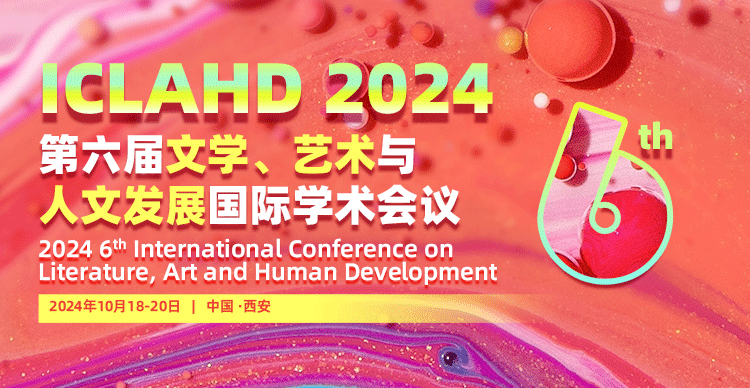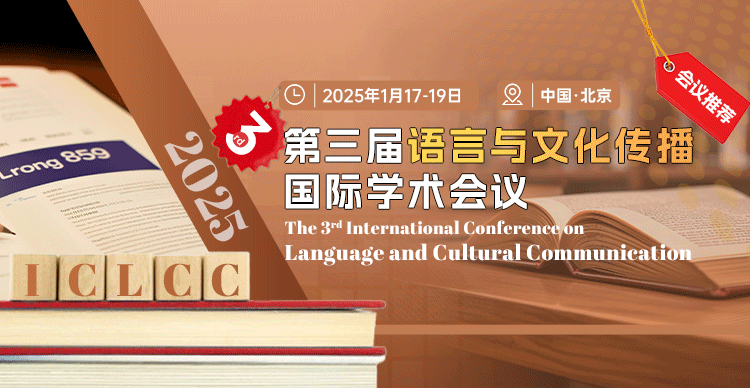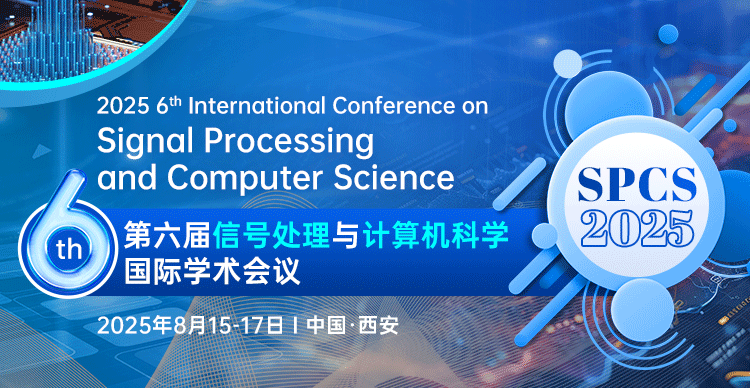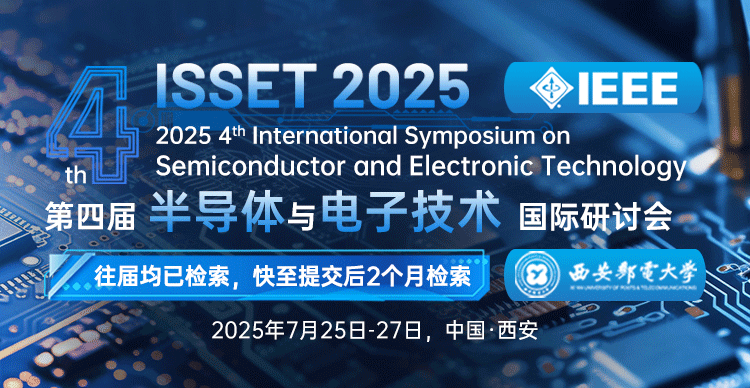第六届文学、艺术与人文发展国际学术会议
2024 6th International Conference on Literature Art and Human Development
大会简介
第六届文学、艺术与人文发展国际学术会议(ICLAHD 2024)定于2024年10月18日至20日在中国西安隆重举行。会议主要围绕“文学”“艺术”“人文发展”等研究领域展开讨论。旨在为文学、艺术与人文发展的专家学者及企业发展人提供一个分享研究成果、讨论存在的问题与挑战、探索前沿科技的国际性合作交流平台。欢迎海内外学者投稿和参会。
征稿主题:
文学
语言,文化与翻译
文学与英语教学
文学与全球化
地域性文学
古诗词的发展
中国的文学翻译
新世纪文学与经典文学
文学理论学习
生态文学
中国女性文学的思想内涵
网络文学
语言文学
艺术
艺术学理论
音乐与舞蹈学
戏剧与影视学
美术学
动画学
中国书画
艺术设计
数字媒体技术
景观规划设计
设计学
文化产业
电影与电影制作
戏曲学
影视管理
音韵学和形态学
人文发展
美学
管理学
文学与艺术的传承
健康教育
历史与社会发展
人文关怀
人道主义
城市健康
公共卫生服务
社会管理体系创新与探索
公共卫生事件
心理健康
健康问题调查及分析
*其它与大会主题相关的文章均可投稿
大会组委:
大会主席
Jon-Chao Hong 教授
国立台湾师范大学,中国
程序委员会主席
Cuneyt Yenigun 教授
Sultan Qaboos University, Oman
Luís Miguel Cardoso 教授
Polytechnic Institute of Portalegre, Portugal
出版主席
Sertac Kaki 教授
Istanbul Technical University, Turkey
冯用军 教授
陕西师范大学,中国
主讲嘉宾:
Prof. Clive Barstow
Edith Cowan University, Australia
简介:Clive Barstow教授是澳大利亚埃迪斯科文大学创意艺术教授,中国上海科技大学名誉艺术教授和中国广东白云学院名誉设计教授。曾于2016年至2021年担任ECU艺术与人文学院的执行院长,(1998-2012)他曾担任艺术与设计学院和(2012-2016)的传播与艺术学院院长。从2017年到2021年,他是澳大利亚艺术领导的最高机构——澳大利亚创意艺术理事会(DDCA)主席,也是澳大利亚Open Bite的主任,该组织鼓励在一些当地土著社区发展和自我管理视觉实践。2019年,Clive Barstow教授被澳大利亚大学艺术与设计学院理事会授予终身奖学金,以表彰他对澳大利亚艺术与设计教育的杰出贡献。他的展览记录包括四十年来在欧洲、美洲、亚洲和澳大利亚的国际展览、艺术家驻地和出版物。他的作品被许多人收藏,包括巴黎蓬皮杜国家艺术中心和美国英国文化协会。Clive Barstow教授定期在中国、欧洲和澳大利亚举办展览,并定期发表关于艺术研究和创造性人文学科的文章。
论文出版:
1. 投递ICLAHD 2024会议的稿件经过2-3位组委会专家严格审核之后,最终所录用的论文将由ASSEHR-Advances in Social Science, Education and Humanities Research (ISSN: 2352-5398)正式出版,见刊后提交至CPCI-SSH和CNKI进行检索。
◆会议论文模板下载→ 前往>>资料下载<<栏目下载
◆会议仅接受英文稿件,如需翻译服务,请联系会务老师
◆会议采用在线方式进行投稿
投稿须知:
*论文应具有学术或实用价值,未在国内外学术期刊或会议发表过。发表论文的作者需提交全文进行同行评审,只做报告不发表论文的作者只需提交摘要。
*作者可通过CrossCheck, iThenticate或其他查询系统自费查重,否则由文章重复率引起的被拒稿将由作者自行承担责任。涉嫌抄袭的论文将不被出版,且公布在会议主页。
*论文需按照会议官网的论文模版排版。
*文章如需翻译润色服务,请联系会务老师了解详情。
*因个人原因撤稿须收取至少30%的撤稿费用。
2. ICLAHD 2024合作英文普刊
《Scientific and Social Research(SSR)》( ISSN:2661-4332)
《科学与社会研究》是一本开放获取、同行评审的国际期刊,其致力于出版科学、社会领域相关的原创性论文、社论、评论文章、意见性论文以及信件等文章。其致力于定量社会科学研究和方法的论文。该期刊的特色文章说明了使用定量方法对社会科学理论进行经验检验。该期刊着重于涉及跨学科学科领域的问题或方法的研究。特别关注仅由一门特定社会科学学科使用的方法,但这些方法可能会以测试社会科学理论的最终目标应用于更广泛的领域。
3. 合作英文期刊
《基础设施、政策与发展杂志》(JIPD) 是一本多学科、双盲同行评审期刊,致力于发表有关基础设施、经济发展和公共政策的高质量文章。期刊名称中的“基础设施”、“发展”和“政策”三个词是本刊的核心。JIPD已被Scopus和ESCI收录,在本刊上发表文章的作者将享受最大程度的曝光。
征稿主题: 教育系统、医疗保健系统、社会制度、制度改革、城市发展、绿色发展、适应气候变化的基础设施、基础设施融资、基础设施管理,其他符合期刊主题方向皆可投稿。
《语言研究论坛》(FLS)是由Whioce Publishing Pte. Ltd.出版的国际同行评议期刊,旨在发表语言学和应用语言学以及语言哲学的最新研究成果。该期刊服务于广泛的读者群体,包括语言研究人员、语言学家、教师、教育工作者、从业人员以及对语言和语言学感兴趣的人士。
征稿主题: 音韵学、句法学、语义学、语用学、认知功能语言学、对话研究、语言教学、语言习得、语言政策、语言哲学、语言景观学,其他符合期刊主题方向皆可投稿。
《环境与社会心理学》(ESP)是一本开放获取,同行评审的国际期刊,其致力于发表有关环境与人类行为、心理之间联系的高质量文章。ESP已被Scopus等数据库收录。
征稿主题: 环境与人类行为之间的联系、环境与人类心理之间的联系、环境对社会心理学的影响,其他符合期刊主题方向皆可投稿。
*期刊将通过会议征集并评判符合发表标准的文章,符合的文章将发表至对应期刊
录用时间:收到审稿报告后2周
见刊时间:文章录用后2周(电子刊)
检索类型:Scopus
- About ICLAHD 2024 -
The 6th International Conference on Literature Art and Human Development (ICLAHD 2024) will be held on October 18-20 2024 in Xi‘an China. Literature is an art that reflects the social life and expresses the author‘s thoughts and feelings by shaping images with language as the means. Art is a social ideology that uses images to reflect reality but is more typical than reality. It includes literature painting sculpture architecture music and so on. Literature is one of the forms of ex
The ICLAHD 2024 is accepting papers for proceeding publication. We accept contributions from those who care about exploring and enhancing the research and innovation in Literature Art and Human Development in the world. We welcome submissions from scholars students and practitioners across many disciplines that contribute to the study and practice of Literature Art and Human Development.
ICLAHD 2024 has been successfully held for five sessions and has provided a great platform for many scholars in this field to exchange ideas. It is hoped that more innovative ideas and results will be harvested at the sixth session in 2024. We warmly invite you to participate in ICLAHD 2024 and look forward to seeing you in Xi‘an China.
Important Dates
Full Paper Submission Date
September 20 2024
Registration Deadline
September 30 2024
Final Paper Submission Date
October 10 2024
Conference Dates
October 20-22 2024
Speakers
Prof. Clive Barstow
School of Arts and Humanities Edith Cowan University Australia
Research Area: Cross cultural and hybrid arts practices utilising practice-led research methodologies to investigate past present and future storytelling through the visual language of art.
Introduction: Clive Barstow is Professor of Creative Arts at Edith Cowan University Honorary Professor of Art at the University of Shanghai Science & Technology China and Honorary Professor of Design at Guangdong Baiyun University China. Prior to moving to Australia in 1992 Clive taught at Middlesex University in London and the Kent Institute of Art and Design. He trained under Eduardo Paolozzi at the University of the Arts London (Chelsea School of Art) and holds a PhD from Griffith University Australia. Clive was Executive Dean of the School of Arts & Humanities at ECU from its inception in 2016 to 2021 prior to which he was head of the Schools of Art and Design (1998-2012) and the School of Communications and Arts (2012-2016).
Clive is a practicing artist and writer. His exhibition profile includes forty years of international exhibitions artist residencies and publications in Europe America Asia and Australia. His work is held in a number of collections including the Musse National d‘Art Modern Pompidou Centre Paris and the British Council USA. Clive continues his international artist profile by exhibiting regularly in China Europe and Australia and publishes regularly on arts research and the creative humanities.
He was President of the Australian Council of Deans and Directors of Creative Arts (DDCA) Australia’s peak body for leadership in the arts from 2017-2021 and is also Director of the Open Bite Australia which encourages the development and self-management of visual practices within a number of local indigenous communities. In 2019 Clive was awarded the lifelong fellowship award by the Australian Council for University Art & Design Schools for his outstanding contribution to art and design education in Australia.
ti
Abstract: This presentation examines the nature of written and visual storytelling rooted in predominantly western socio-political realism and reimagined in the context of complex global cultures in flux. Through visual art practice I propose new scenarios ba
In line with Lefebvre’s dialectic approach I argue that his various models of spatial triads posit a connected model of space that is open ended and more able to combine the constituent parts of our increasingly homogenised cultural groups that can no longer be defined by singular specific locations or established conventions of time. The concept of abstract space is used to evoke multicultural time-scapes and spatial imaginaries across two and three-dimensional artworks through which we can question the construction of cultural norms within the established framing of history and place.
A. Prof. Hsuan Lee
Zhaoqing University China
Research Area: Music performance instrumental ensemble string pedagogy
Introduction: Major in violin performance and teaching. The first project the doctoral dissertation “Towards A Dynamic Pedagogy:Contemporary Pedagogical Approaches to Basic Violin Technique” was published in 2003. The recent research focuses on heterogeneous violin teaching and student orchestra teaching methods. A violin pedagogy article “高校小提琴选修课程创新研究——以肇庆学院为例” was published in July2021. Another article regarding violin performance practice “The Violin Bow Evolution That Affected Violin Music in 18th and 19th Century” was published in August 2021.
Lately Dr. Lee is making an effort to establish a new focus on college student orchestras to explore better teaching methods and refine rehearsal technique.
ti
Abstract: Establishing a symphony orchestra is the ultimate form of presentation in music performance education. Every successful performance represent the perfect combination of music theory and performing skills Symphony orchestras have been a symbolic representation of music departments. Despite the ambition and aspiration of establishing orchestra l ensembl!e courses the unique circumstance in Chinese higher education has brought various obstacles. Facing the difficulties of various situation the author shares his conclusions of 20-year experience and experiment in student orchestra practice. The problems and solutions will be fully discussed.
A. Prof. Zhao Chengqing
College of Arts Sichuan University China
Research Area:Early Overseas Sinologists New China Art History Design Culture
ti
Abstract: From the second half of the 19th century to the beginning of the 20th century with the development of the Westernization movement and the infiltration of Western culture to the east some ingenious device including camera phonograph and typewriter began to be introduced into China. Chinese people mainly show two attitudes towards this: on the one hand they are confused and amazed at Western scientific and technological achievements; On the other hand they remained conservative and rejected. Driven by the development of consumer culture and industry the camera phonograph and typewriter represented the variation of aesthetic modernity and social modernity and through images sounds and words they also shaped the image of modern China from the perspective of the knowledge production and dissemination.
A. Prof. Andrew William PEAT
Beijing Normal University – Hong Kong Baptist University United International College China
Research Area: Film production Directing Post-Sound Screenwriting
Introduction: Andrew graduated with honours from the University of California Davis earning certificates of excellence from both the English and History departments and studied a full year of History as an exchange fellow at Scotland‘s oldest institution University of St Andrews. He earned a Master of Fine Arts in Film and TV Production from the USC School of Cinematic Arts while gaining experience in various areas of film production working on over 50 films (shorts and features). He has focused on directing sc
ti
Abstract: One of the most common mistakes students (and even professional filmmakers) make is to allow the “tail to wag the dog.” Top talent is a clear benefit the best cameras and lenses can certainly help create great looks and money to throw at various aspects of production like stunts and special effects is every filmmaker’s dream. But how much money and how many resources are wasted every year on making let’s be blunt bad movies?
The filmmaking process is one of the most difficult and demanding of the creative industries because it requires a variety of talents and skills as well as tight collaboration. A poet can sit at home alone and write. A painter can run a solo studio. But a film is never made by one person.
Over the course of the past 10 years I have guided around 500 student film projects and through that experience have learned some of the most common mistakes and pitfalls students make as well as some key factors in making good and memorable student films. This presentation will share some key lessons I have learned in guiding the student filmmaking process and helping them to make better and better films.
- Call For Papers -
The topics of interest for submission include but are not limited to:
Literature
· Language Culture and Translation
· Literature and English teaching
· Literature and Globalization
· Regional literature
· The development of ancient poetry
· Chinese literary translation
· New Century literature
· Classical literature
· Study of literary Theory
· Ecological literature
· The ideological connotation of-
· Chinese female literature
· Network literature
· Language and literature
Art
· Theory of art
· Music and dance
· Drama and Film Studies
· Fine arts
· Animatronics
· Chinese painting and calligraphy
· Artistic designing
· Design Science
· Culture industry
· Film and film production
· Drama Studies
· Film and television management
· Phonology and morphology
Human Development
· Aesthetics
· Inheritance of literature and art
· Health Education
· History and social development
· Humanistic concern
· Humanitarianism
· Innovation and exploration of social management system
· Mental health
· Investigation and analysis of health problems
Publication
Submit to Conference Proceedings (CPCI CNKI)
1.After a careful reviewing process all accepted papers after proper registration and presentation papers will be published in ASSEHR-Advances in Social Science Education and Humanities Research (ISSN: 2352-5398) and submitted to CPCI CNKI for indexing.
① The article conforms to the theme and requirements of the conference
② No repeated contributions to other conferences or journals
③ Original articles with experimental research data
④ Repetition rate is less than 30%
Note: All submitted articles should report original previously unpublished research results experimental or theoretical. Articles submitted to the conference should meet these criteria and must not be under consideration for publication elsewhere. We firmly believe that ethical conduct is the most essential virtual of any academic. Hence any act of plagiarism is a totally unacceptable academic misconduct and cannot be tolerated.
Note: All submitted articles should report original research results experimental or theoretical not previously published or under consideration for publication elsewhere. Articles submitted to the conference should meet these criteria. We firmly believe that ethical conduct is the most essential virtue of any academics. Hence any act of plagiarism or other misconduct is totally unacceptable and cannot be tolerated.







